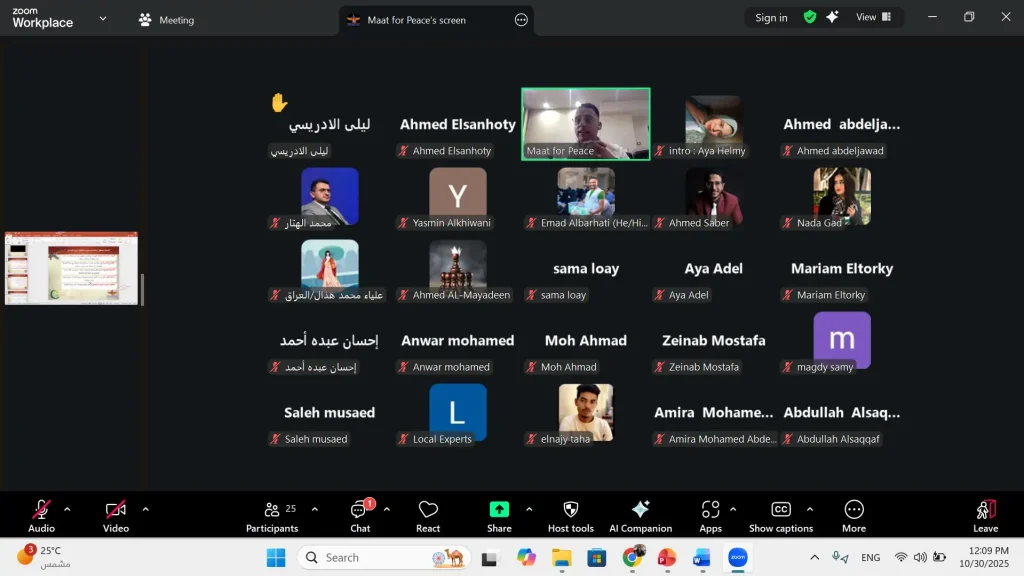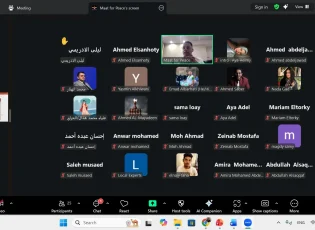Okeil: UN estimates confirm that the Ethiopian government has committed genocide
Tewodrose Tirfe: Arms deals obtained by the Ethiopian government exacerbate the humanitarian catastrophe for Ethiopian people
Mukhtar: Arms transfers to Ethiopia violate Articles 6 and 7 of the Arms Trade Treaty
Maat for Peace, Development and Human Rights organized a panel discussion entitled “The Impact of Military Support Provided to the Ethiopian Government on Violations of the Principles of International Humanitarian Law” on the sidelines of its participation in the working group meetings and the second informal preparatory meeting for the Tenth Conference of States Parties to the Arms Trade Treaty. This comes within the framework of Maat’s Human Rights Initiative “The Trade of Death”: Towards Effective Implementation of the Arms Trade Treaty".
The panel discussion addressed the irresponsible export of weapons, parts, and ammunition to the Ethiopian government, in light of the risk that they will be used in committing or facilitating serious violations of international humanitarian law or international human rights law. The Ethiopian armed forces have carried out a number of indiscriminate and disproportionate attacks on civilians, resulting in a significant loss of life, as well as depriving them of the basic necessities for survival. These military actions destroyed a number of homes, schools, hospitals and infrastructure, and a large number of women, especially in the Tigray and Amhara regions, have been subjected to sexual violence.
 During the discussion, Ayman Okeil, the international human rights expert and chairman of Maat, said that international and human rights estimates have documented the crimes and violations of the Ethiopian armed forces against international human rights law and international humanitarian law since 2018, which constitutes war crimes and genocide under Article 55 of the Fourth Geneva Convention and Articles 6, 7, and 8 of the Rome Statute of the International Criminal Court. Okeil added that many countries, especially parties to the Arms Trade Treaty, supply the Ethiopian forces with weapons, equipment, ammunition, and drones. The human rights expert called for the need to immediately stop transferring weapons shipments, parts, and ammunition to the Ethiopian government and all parties to the armed conflict.
During the discussion, Ayman Okeil, the international human rights expert and chairman of Maat, said that international and human rights estimates have documented the crimes and violations of the Ethiopian armed forces against international human rights law and international humanitarian law since 2018, which constitutes war crimes and genocide under Article 55 of the Fourth Geneva Convention and Articles 6, 7, and 8 of the Rome Statute of the International Criminal Court. Okeil added that many countries, especially parties to the Arms Trade Treaty, supply the Ethiopian forces with weapons, equipment, ammunition, and drones. The human rights expert called for the need to immediately stop transferring weapons shipments, parts, and ammunition to the Ethiopian government and all parties to the armed conflict.
 Ethiopian human rights activist and president of the American Amhara Association, Tewodrose Tirfe, explained that Ethiopia has been involved in several wars and civil conflicts since Abiy Ahmed came to power. Many ethnic minorities in the country have been deprived of their lands and subjected to systematic violations of the principles of international humanitarian law, especially civilians in the Amhara region. He affirmed that the weapons deals obtained by the Ethiopian government, especially from China, Russia, and the parties to the Arms Trade Treaty, fuel illegal killings and the humanitarian disaster facing the Ethiopian people, indicating the failure of many countries to fulfill their international obligations to stop arms transfers for use in committing war crimes within Ethiopia.
Ethiopian human rights activist and president of the American Amhara Association, Tewodrose Tirfe, explained that Ethiopia has been involved in several wars and civil conflicts since Abiy Ahmed came to power. Many ethnic minorities in the country have been deprived of their lands and subjected to systematic violations of the principles of international humanitarian law, especially civilians in the Amhara region. He affirmed that the weapons deals obtained by the Ethiopian government, especially from China, Russia, and the parties to the Arms Trade Treaty, fuel illegal killings and the humanitarian disaster facing the Ethiopian people, indicating the failure of many countries to fulfill their international obligations to stop arms transfers for use in committing war crimes within Ethiopia.
During the panel discussion, Mohamed Mukhtar, director of the International Humanitarian Law and Disarmament Unit at Maat, emphasized that no state party to the Arms Trade Treaty should take the decision to authorize the transfer or transit of weapons to a conflict zone where the weapons are used to commit war crimes and other serious violations of international law, as this violates Articles 6 and 7 of the Arms Trade Treaty as well as Common Article 1 of the Geneva Conventions of 1949.
 In conclusion, the panel discussion concluded with a set of recommendations, including the need for states to suspend all arms transfers that could be used by any of the warring parties in Ethiopia immediately and permanently, while emphasizing the need for civil society organizations engaging with various international and regional mechanisms, such as the Human Rights Council or the African Commission on Human and Peoples' Rights to conduct comprehensive and impartial investigations into the violations committed by Ethiopia to ensure accountability and non-impunity. Additionally, submitting documents to representatives in the parliaments and legislative assemblies of countries that provide military support to the Ethiopian government to pressure their government to withdraw that support because it contributes to exacerbating human rights violations.
In conclusion, the panel discussion concluded with a set of recommendations, including the need for states to suspend all arms transfers that could be used by any of the warring parties in Ethiopia immediately and permanently, while emphasizing the need for civil society organizations engaging with various international and regional mechanisms, such as the Human Rights Council or the African Commission on Human and Peoples' Rights to conduct comprehensive and impartial investigations into the violations committed by Ethiopia to ensure accountability and non-impunity. Additionally, submitting documents to representatives in the parliaments and legislative assemblies of countries that provide military support to the Ethiopian government to pressure their government to withdraw that support because it contributes to exacerbating human rights violations.
shortlink: https://maatpeace.org/en/?p=42184












